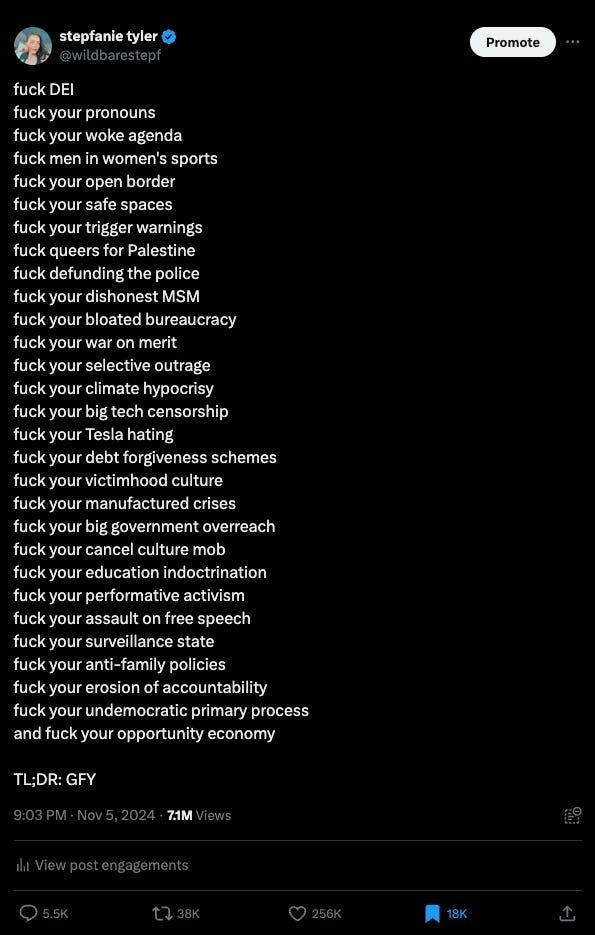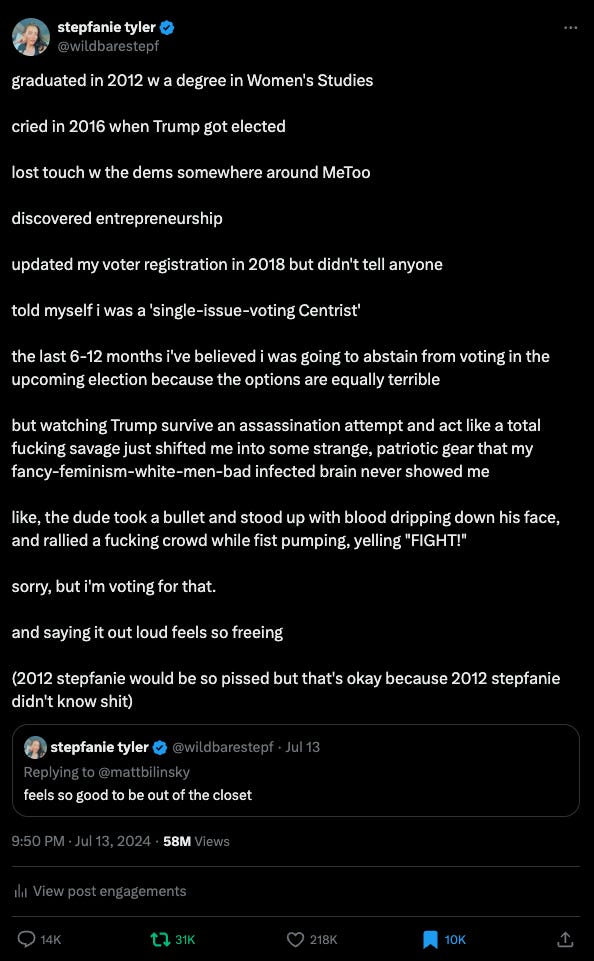In Elon We Trust: The Tweet, the Town Square, and the Freedom to Be Bold
How Elon and 𝕏 Unlocked a New Era of Free Speech
This was one of my most viral posts ever so I wanted to do a little post-mortem on it (no pun intended), especially considering Trump just won the popular vote—meaning, this post popped off because you all felt so seen :)
The post in question 👇🏼
Let’s get into this “post” mortem, shall we? :)
Election night, 2024. My post goes out—a raw, unfiltered list of frustrations that, apparently, struck a nerve. Within hours, engagement is through the roof. I didn’t expect it, but there it was: thousands of people resonating with what I'd said, feeling the same disillusionment, and relieved, maybe, to see someone just say it. I was honestly surprised by the engagement because I figured it would get throttled due to how many times I used the F-word.
All of this is surreal, really. I was a lifelong Democrat, with a degree in women’s and gender studies—a “lefty” by most measures. Yet here I am, voting for Trump and feeling like I’ve had enough of the Left’s “progress.” It’s not so much that I’ve changed at my core, but more that the Left moved so far left that it left the people behind.
I also can’t help but feel like none of this would have been possible without Elon buying Twitter and transforming it into the free speech town square it’s become. Without that shift, these sentiments would likely still be simmering in private—too dangerous to voice publicly— and definitely too dangerous for old Twitter.
In the past, Twitter was a platform where speaking too openly was a risk. Certain opinions, even if reasonable, could lead to shadow bans or outright suspension. Elon’s acquisition of Twitter, though, changed all that. He redefined the platform as a modern-day town square—a place where people from all walks of life could express their views without fear of being silenced. It’s almost funny to think that a billionaire buying a social media site is what it took to bring true open discourse back to the public.
My post—the one that many found relatable but, in the old Twitter days, might’ve been labeled offensive or “problematic”—was possible because 𝕏’s new approach didn’t dictate what was “acceptable.” It’s not that everyone has to agree with each other, but at least now, people have the chance to openly discuss things without worrying about whether they’re on the “approved” side of history.
Breaking Down the Frustrations: Why the Left Lost People
So, what exactly did I say? The tweet was a series of “fck your…” statements that called out the things that feel performative or, frankly, absurd about today’s Left. “Fck DEI,” “fck your pronouns,” “fck men in women’s sports”—each line a straightforward, unapologetic frustration with ideas that have been pushed to the forefront, often at the expense of common sense or fair discourse.
Each point in the post reflects a shift on the Left that seems disconnected from the average person’s reality. DEI initiatives, for instance, started as a way to level the playing field but often end up feeling like mandatory performances, with little regard for genuine inclusion. The pronoun obsession? To many, it’s less about respect and more about enforcing a language code that feels forced. These aren’t trivial frustrations—they represent a pattern of ideological rigidity that disregards complexity, nuance, and, honestly, reality.
The Town Square Effect: How Free Speech Unleashes Authenticity
Without Elon’s “town square” vision for Twitter, these frustrations might have stayed suppressed, smothered under layers of “political correctness”—and if you’ve followed me for a while, you probably know by now that I consider political correctness to be censorship masquerading as manners. Elon’s approach to 𝕏 has created a space where people can finally say, “This doesn’t make sense to me,” without fearing the usual labels of bigot, fascist, or worse.
The town square, as Elon envisions it, isn’t about catering to one side or another; it’s about letting ideas clash, allowing people to hash out their views in public. In an era where people have grown used to the idea of “safe spaces,” this is a radical concept. But there’s power in it. By taking the reins off speech, 𝕏 lets people be real—even if that means being controversial.
It’s worth noting here, too, that Elon has reiterated that “freedom of speech does not equal freedom of reach”—if you’re using hateful speech, your reach will likely be limited… but you’re sure as hell allowed to say it.
The Long Arc: How a Democrat Came to Vote for Trump
For me, this shift isn’t just about one post—it’s a snapshot of a broader journey. A decade ago, fresh out of college with a women’s and gender studies degree, I would’ve thought voting Republican was unthinkable. But the Left’s relentless push further left has left a lot of us in the dust. Policies and ideas that once sounded progressive have turned rigid and out of touch, imposing rules rather than sparking progress. What was once about equality has morphed into an obsession with identity politics and purity tests.
When I cast my vote for Trump, it wasn’t because I’d suddenly become conservative. It was because the Left no longer feels like it represents reality. Instead, it feels like it’s performing activism, enforcing language, and punishing anyone who questions the new orthodoxy. And without 𝕏—without that town square where I could see other people questioning the same things—I might have stayed quiet and continued to go along with it.
Speaking of breaking the silence and my long arc, this is the post that sorta triggered it all for me on 𝕏—Elon quote tweeted it, Rolling Stone mentioned it, I was on Fox News, etc. Truly insane to think about a timeline where I didn’t find the courage to hit “post” the night of that first assassination attempt.
Why This Moment Resonates: The People’s Silent Rebellion
If the popularity of that post says anything, it’s that people are tired of being told what they can or can’t say. They’re tired of being labeled or ostracized for having reasonable doubts or frustrations. The Left, as it stands now, has alienated the very people it claims to protect by refusing to engage in open dialogue and shutting down anyone who doesn’t conform. And that’s why this moment resonates so deeply—people feel seen, finally, in their own town square, where there’s no algorithm or “sensitivity team” filtering out their views.
𝕏 isn’t just about giving people back their voices—it’s about giving them back their agency. It’s about allowing people to question and challenge without fear, to voice opinions that, in another era, might have been dangerous to share. It’s a place where people can be as complex, contradictory, and messy as they are in real life.
My post on election night wasn’t just a rant. It was a declaration of the right to be frustrated, to question, to reject what doesn’t feel true. And thanks to 𝕏, I—and millions of others—could finally say it. We’re living in a time when simply speaking your mind feels revolutionary, and that’s a testament to how constrained our discourse has become.
If there’s one takeaway from all this, it’s that people want to be heard, not managed. Furthermore, it’s that we are the majority! And we don’t have to be silent any longer.





